Are there Ides of December? That would be today, if it were a thing. The magic of the Internet likely makes it possible I could simply look up this fact but I throw it out to the collective wisdom of readers and listeners of Charlottesville Community Engagement to let me know for certain. I’m Sean Tubbs, and I’ve got far too many things to investigate as it is.
On today’s program:
The developers of a 245-unit development on East High Street submit a new preliminary plan in response to a preliminary denial from Charlottesville Planners, and two attorneys weigh in
A former Charlottesville City Manager has left a job running a similar community in North Carolina
Champion will farm out its brewing and distribution to a North Carolina “brewing platform”
Albemarle County is waiting on the results of a grant application for state funding to help make a 31 acre portion of the North Fork Discovery Park even more “business-ready”
An update on a ongoing study to determine a better structure to govern transit operations in the area
First shout-out: Clay 1613
What does 19th-century slaveowner and US statesman Henry Clay have to do with legendary boxer Muhammad Ali? The Albemarle Charlottesville Historical Society in partnership with The Center at Belvedere will welcome Leontyne Clay Peck for a screening of her newly released documentary: CLAY 1613: An American Family in Black & White. This will take place Thursday, December 22 at 6 p.m. at the Center.
The film explores Mrs. Peck's 18-year journey finding and documenting her Clay family ancestry - the Black and White, known and unknown, rich and poor descendants of the planter, John Clay, who arrived in Jamestown, Virginia, by 1613.
Bring your family and join us to learn more about this unexpected connection and much more! The film screening will be followed by a discussion with Mrs. Peck with time for questions from the audience. Register at thecentercville.org.
New site plan filed for 245 units off of East High Street
Consultants hired by Seven Development have submitted a second plan for a project to build 245 apartment units off of East High Street on a property within the floodplain. City staff issued a preliminary denial in October.
An attorney hired by the firm has also weighed in on a memo stating the modified plan should comply with city regulations.
“We contend that the updated preliminary site plan application dated December 7, 2022 complies with all applicable provisions of the zoning ordinance,” wrote Valerie Long with the firm Williams Mullen. (read the memo)
The revised plan looks much the same with the same footprint of 322,000 gross square feet, but the description of building height now states clearly the structures will be in the B-1 zoning district. The plan now breaks down the 245 units as being 25 studios, 135 one-bedroom units, and 85 two-bedroom apartments.
In an email this morning to Charlottesville Community Engagement, Civil Engineer Justin Shimp also said that there are now sidewalks from the project to East High Street, sidewalk improvements on Caroline Avenue, and a path from the development to the Rivanna Trail that he said would be compliant with the Americans with Disability Act.
The plan also notes that the Rivanna River Company is expected to remain on the property.
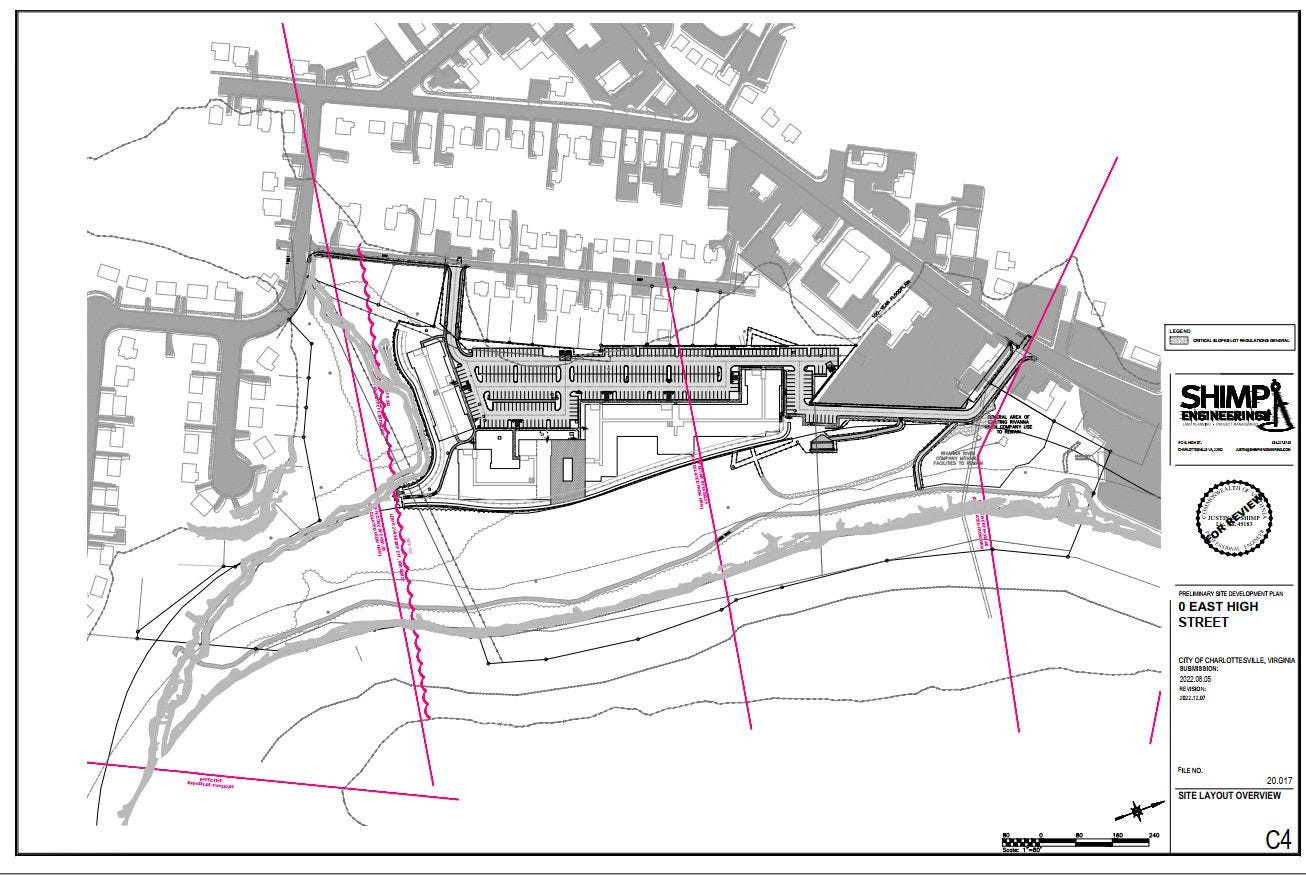
In her memo, Long rebutted several of the reasons that led staff in the Department of Neighborhood Development Services to deny the site plan. The project is being submitted by-right which means the developers contend they do not need a legislative decision from City Council to grant them the use of the property as they have described.
However, staff issued several reasons for denial in a letter dated October 26 including an interpretation of the city’s current zoning matrix that claimed an entrance to the site could not be made from Caroline Avenue, which is a residential district. A second entrance would enter the site from land on East High Street zoned Central City Corridor. (read the October 26, 2022 letter)
“Given that multifamily residential is a by-right use in the [Central City Corridor] district, and that the Property has frontage on E. High Street such that the proposed multifamily use is not ‘adjacent’ and thus not a separate primary use, the cited provision of the Use Matrix for the Mixed Use Corridor districts is inapplicable to the Site Plan Application,” Long wrote.
Long said that provision has not been applied in other situations, and called the city’s interpretation “absurd and illogical.” Her memo uses the example of the Dairy Market as an existing site in the city that should not have been permitted under staff’s logic, as well as the 3-Twenty-3 building downtown.
Shimp Engineering is the firm who worked on the design. They also had a response letter to city staff. One comment from the city suggested that smaller house-sized buildings be built instead given the General Residential designation in the city’s Future Land Use Map. Staff at Shimp have a different interpretation. (read the response letter)
“While the FLUM recommends the development of General Residential zones as house-sized structures, the 0 E High property presents a unique opportunity to provide a substantial amount of housing that is near the City center,” reads their response letter.
An attorney hired by opponents of the development has responded with a letter of his own, citing the 2005 Virginia Supreme Court ruling in Capelle v. Orange County which involved another development that had multiple types of zoning in it. That case had to do with a road across residential property that was to be used to access a mining operation.
“[The Supreme Court] rejected the developer’s argument that the property must be considered as an integrated unit and instead held that portions zoned differently must be treated according to the zoning restrictions for that particular category of zoning,” reads the letter from Henry H. Perrit Jr. (read the letter)
Perrit cited several other examples in his six-page letter and argues Long’s examples are all invalid.
City staff will review the new submission and provide comments by January 20.
Maurice Jones resigns as town manager in Chapel Hill
The man who served as Charlottesville’s City Manager from late 2010 to the middle of 2018 stepping down as the administrator of a town near the University of North Carolina’s main campus.
“It’s been an honor to serve the Town of Chapel Hill over the past four and a half years,” Maurice Jones in a press release that went out on Tuesday. “After an assessment of my personal priorities, I have made the difficult decision to resign from my position as town manager.”
Jones spent over four years in Chapel Hill. He became Charlottesville’s director of communications in 1999 and held that position for six years before leaving for a job related to the University of Virginia. Jones returned to the city as an assistant city manager in 2008 before being appointed as interim manager in 2010.
The Chapel Hill Town Council has already appointed an interim administrator.
Meanwhile, the city is still without a person overseeing its communications in a position now called Director of Communications and Public Engagement. The job is posted if you want to throw your hat in the ring.
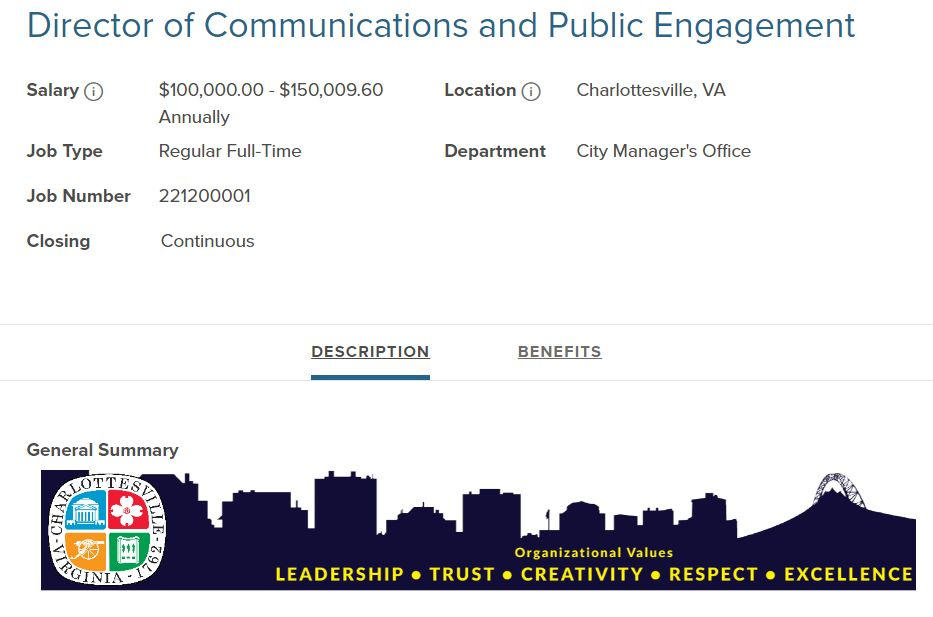
Champion hands over beer distribution and licensing to North Carolina company
A Charlottesville brewery that launched in 2012 and spawned a restaurant group will now have the bulk of their distribution conducted by a North Carolina “beverage platform” called Bevana.
“All of the breweries’ distribution will now be handled by the platform, alongside their ever-growing portfolio of independent craft partners,” reads a press release sent out Tuesday.
Ten people have been laid off according to a spokesperson for Champion.
Bevana, formerly known as Community Brewing Ventures, is based in Newton, North Carolina. The company markets and distributes products that are created elsewhere.
“At Bevana, we help independent beverage makers to create more of the drinks that you love, and connect them with our retail, distribution, and e-commerce channels to let you find and enjoy them,” reads a section of their website.
Bevana’s master brewer is Levi Duncan, who helped launch Champion.
Last November, Champion announced a merger with Reason, a brewery that opened in Seminole Place in 2017. The idea was for Champion to move its production facilities from Broadway Street in Albemarle County to the larger space. Reason’s taproom will close at the end of the year.
Local breweries will combine but distinct products will remain, Daily Progress, November 16, 2021
“Better Together”: Charlottesville’s Champion Brewing Company and Reason Beer to Merge, Charlottesville29, November 16, 2021
Becoming One: The Benefits Champion & Reason See in Merger, Jon Sicotte, November 29, 2021
Champion was one of the first breweries to open in Charlottesville to take advantage of a new law that allowed agricultural producers to operate tasting rooms outside of local zoning controls. A taproom opened on 6th Street without a commercial kitchen and relied on food trucks. The company later began offering its own food.
Around the same time as that, CEO Hunter Smith began to branch out to additional locations and into food service. The Champion Hospitality Group opened several restaurants such as the Champion Grill in Stonefield, Saison Brasserie on the Downtown Mall, and Siren in the Vinegar Hill Shopping Center below Stapes. Passiflora was opened in the former Commonwealth Restaurant and Sky Bar. In 2020, the Champion Ice House launched in Gordonsville in partnership with chef Craig Hartman.
Both Champion Grill and a Champion brewery in Lynchburg have both closed within the past few months.
The taproom on 6th Street will remain open and will continue to brew beer.
Albemarle County seeking state funds to prepare North Fork for economic development
Albemarle County’s economic development office is waiting on the results of a grant application to help prepare a location to reach a new level of certification from the Virginia Economic Development Partnership.
“This is a process we’ve been in since September where we are working with the University of Virginia Foundation to ready 31 and a half acres within North Fork,” said J.T. Newberry, Principal Business Development Manager for the office.
Site selection officials visited the area to ask questions about their grant application for work to get a site to “Tier V” status under the Virginia Business Ready Site program.
“We’re asking for about $7.5 million to ready that 31.5 acres,” Newberry said. “That would essentially allow us to accommodate a prospect within 12 to 18 months with much more confidence than we have now.”
That would include an access road. Newberry said a recommendation will be made to Governor Glenn Youngkin and an announcement should be out within the next month or so.
Newberry made his comments at the December 13, 2022 meeting of the Economic Development Authority’s Board of Directors.
Today’s second shout-out: LEAP wants to help you prepare for winter
Crisp air and colorful leaves. Hot cocoa. Snow days. There are plenty of reasons to get excited about fall and winter, but the return of high heating bills isn't one of them. Your local energy nonprofit, LEAP, has been empowering Virginians with energy efficiency and solar solutions since 2010. With programs for all income levels, residents can access upgrades like insulation, LED bulbs, low-flow fixtures, and affordable rooftop solar systems. Visit www.leap-va.org to learn more, and fill out the LEAP Services Inquiry form to lower high heating bills and stay cozy this winter.
Governance study: A primer on regional transit systems
For much of the past year and a half, planners at the Thomas Jefferson Planning District Commission and hired consultants have been crafting a Regional Transit Vision intended to make public transportation be a more effective option for people to get around the broader community.
Now, some of those consultants are working with the TJPDC on a study to recommend how to move from a system of multiple transit agencies to something more unified. This is the second attempt to create a regional transit authority in the area.
Stephanie Amoaning-Yankson with AECOM said the study will recommend strategies to expand governance opportunities for localities in the entire region and to identify new forms of revenue. The main idea is to create a government entity similar to the Central Virginia Transportation Authority which receives tax dollars related from transportation spending.
“This is going to be a year-long study and we kicked-off a few months ago so this will carry on through December 2023,” said Amoaning-Yankson.
The work will involve reviewing the existing systems, reviewing what peers are doing, and reviewing what enabling legislation may exist for those new forms of revenue.
“Once we have a good understanding of the funding piece, then we can develop some scenarios for governance and funding allocation,” Amoaning-Yankson said.
Some of that work has already taken place. Amoaning-Yankson explained some of the history of transit in the area.
For instance, Charlottesville Area Transit began as a division of the city’s public works department in 1975. In 1978, what was then called Charlottesville Transit Service began providing some service in Albemarle County on a contract basis. In 1985, the service began to handle pupil transportation as well. The rebranding to Charlottesville Area Transit took place in 2010.
The City of Charlottesville has sole control over CAT and taxpayers are contributing over $2.5 million to the service in the current fiscal year.
Charlottesville Area Transit has an advisory board that has not met since before the pandemic. (website)

Jaunt was formed in 1982 as a public service corporation with 100 shares of stock split between Albemarle, Charlottesville, Fluvanna, Louisa, and Nelson. There is a 12-member board made up of appointees from those localities.
“They have four each from the city and Albemarle and two each from Fluvanna, Louisa, and Nelson,” said Amoaning-Yankson.
The University Transit Service is a division of the University of Virginia’s Department of Parking and Transportation and is funded by student fees and other sources of revenue. There is no federal money involved in the UTS budget.
“The three main transit services are very different in terms of governance structure and their organization set-up,” said Amoaning-Yankson.
Amoaning-Yankson also said there will be outreach to localities to gauge their interest in participation. The next step is the peer review study.
Rebecca White of UTS wanted the partnership and the audience at home to know that UVA does financially support both CAT and Jaunt.
“We are supportive of the Jaunt Connect services,” White said. “We are interested in the work trips, supporting work trips, with the fixed-route Crozet Connect, Buckingham Connect.”
Garland Williams, director of Charlottesville Area Transit, said new revenues will be needed to increase service in as robust a manner as called for in the Regional Transit Vision Plan.
“The general funds from the city and the county are not going to be able to support that,” Williams said.
The study comes at a cost of $150,000, with the Department of Rail and Public Transportation covering half the cost. Albemarle, Charlottesville, and the TJPDC are picking up the rest.
Here are some other bits of transit information from the rest of the partnership meeting:
There are other studies underway at the moment related to transit. Charlottesville Area Transit has been working on a fuel alternative study and that will enter into the stakeholder phase with completion in March. Jaunt has had a public process to go through a similar study and have met three times this year with all of the information posted online. (Jaunt Alternative Fuel Advisory Committee website)
Albemarle County Schools have issued a request for proposals for third party vendors to provide limited transportation services. You can learn more on the county website.
Charlottesville Area Transit will soon launch work on a transit strategic plan. These plans are required by the Virginia Department of Rail and Public Transportation. (learn more)
Williams also told the partnership that the city has an additional $300,000 in additional revenue that can go to benches and shelters, but a project manager is required to make that happen.
The next meeting of the Jefferson Area Regional Transit Partnership is on January 26, 2023. Prepare by watching the video, but the audio quality is not very good.
Watch the whole video here:
Reading material:
U.Va. extends offers of admission to 24 percent of early decision applicants, Merrill Hart, Cavalier Daily, December 14, 2022
Albemarle parents settle with state over mask mandate lawsuit, Alice Berry, Charlottesville Daily Progress, December 14, 2022
Miller School looks to expand, but needs first-ever special use permit, Felicity Taylor, CBS19 News, December 14, 2022
Schools get $500,000 in budget carryovers, Heather Michon, Fluvanna Review, December 15, 2022
Concluding passages from #472
We are now at the end of another edition of this program, with a whole lot of information put together within the last 24 hours or so. The hope had been to get most of this out yesterday, but I opted not to work to a deadline. I let people know about my decision via the chat function on Substack. I had been making those updates on Twitter, but my days on that platform are likely numbered. So, if you want to know more about what’s happening with each show, take a look at the chat!
Now, on to begin work on the next one which will have information from the Charlottesville Planning Commission from the other night. In a perfect world, I would have coverage of that on Wednesday and it’s my hope that by the time there are hundred or more of these done I will be able to pay at least one person to help me gather and present the information.
That’s possibly where you come in! There are now close to 1,800 subscribers on this list, and between a fourth and a third contribute financially in some way. There are many options to do so, but I must state again I am not a non-profit. Instead, I am taking advantage of the services Substack offers to help authors and writers seek an independent path, financed by readers and listeners.
A neat thing, too, is that Internet provider Ting will match your initial payment at any of the three levels on offer. $5 a month? Ting will match. $50 a year? Ting will match that? $200 a year? Ting will do that, too!
If you want to join them, Ting will match your initial payment. The internet company sponsors the work here on Charlottesville Community Engagement whether it be at the $5 a month, $50 a year, or $200 a year level.
Either way, do consider Ting for high-speed Internet. If you sign up at this link and enter the promo code COMMUNITY, you’ll get:
Free installation
A second month for free
A $75 gift card to the Downtown Mall
I am confident there’s a market for the kind of journalism I practice, and I will hold up my end of of the bargain by working tirelessly to bring you more information. Thanks for reading.
Thanks as well to Tatyanna Patten and Jenn Finazzo for their audio contributions today. In return, Jenn wants you to know about Fiori Floral Studio for all of your holiday floral needs.




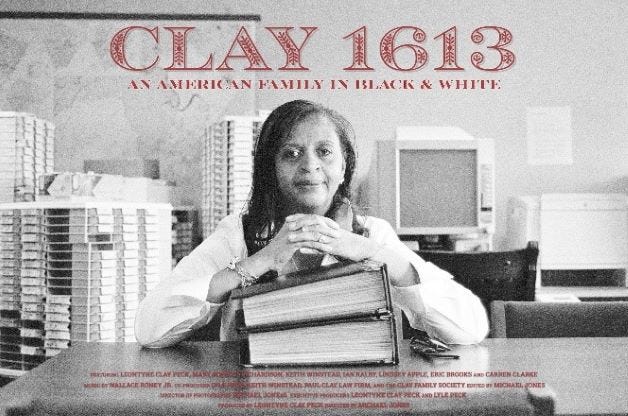

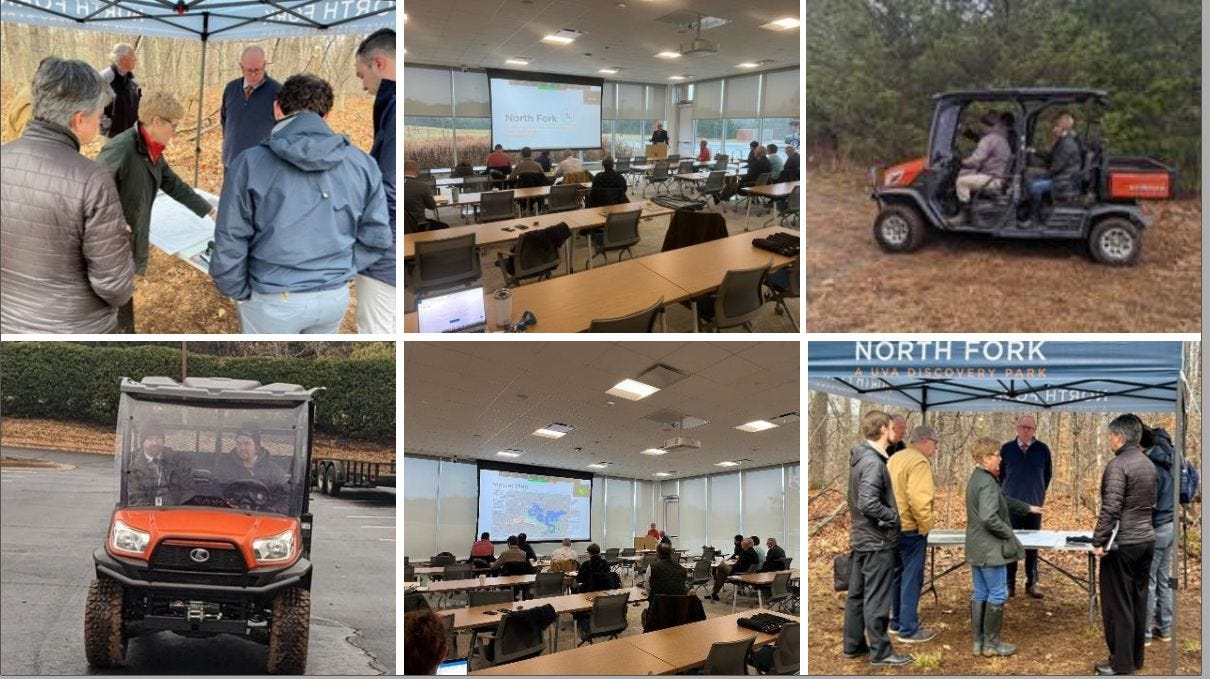

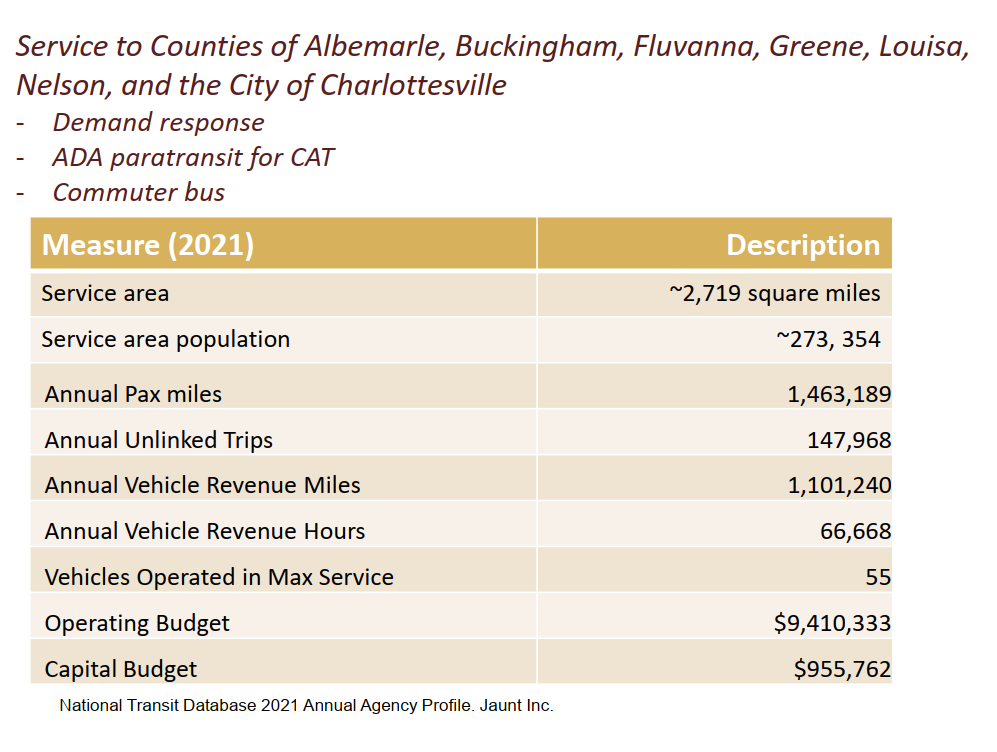










Share this post